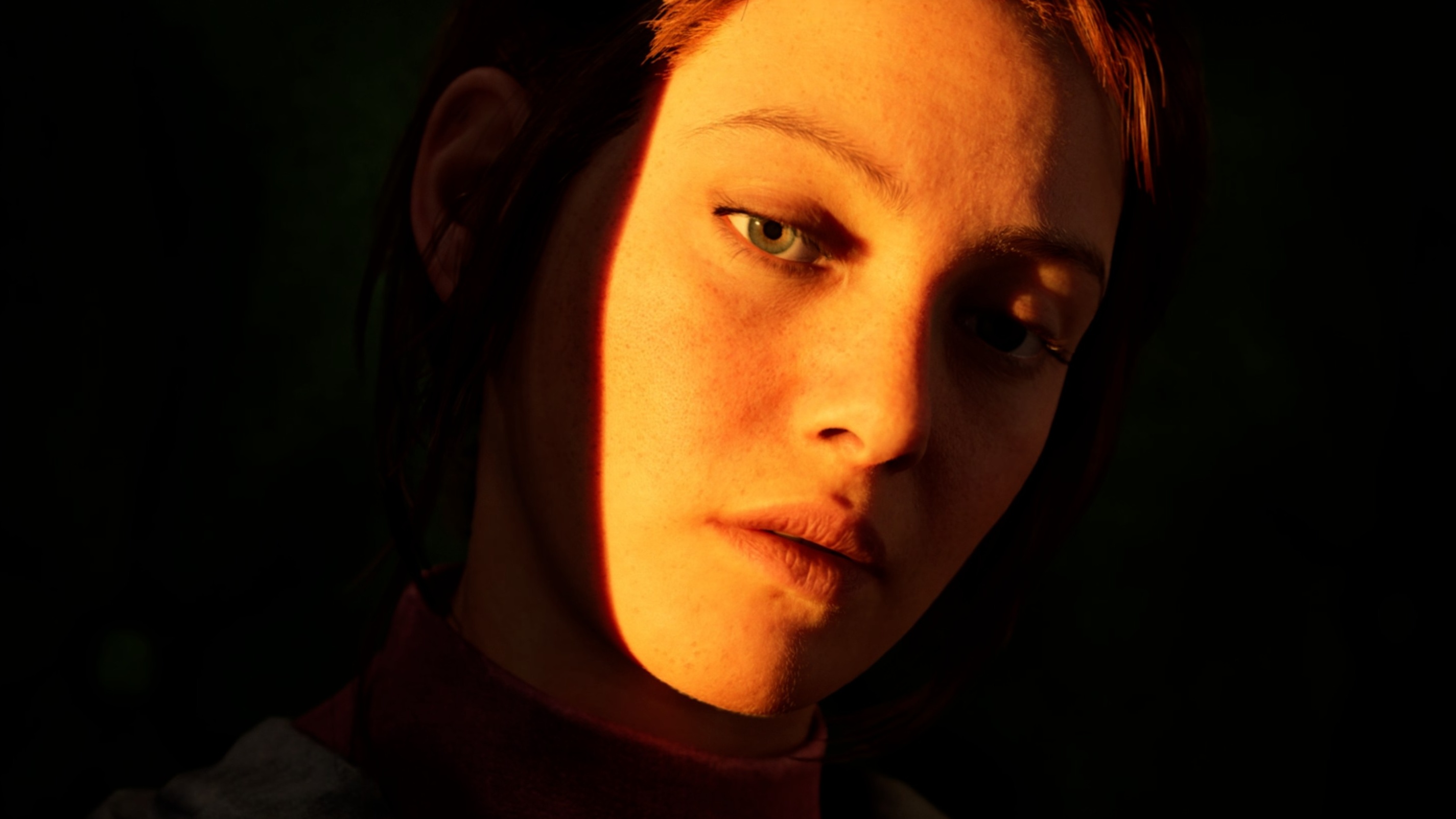It's hard not to feel sorry for the overshadowed 1992 Dune game
We're rerunning Richard Cobbett's classic Crapshoot column, in which he rolled the dice and took a chance on obscure games—both good and bad.
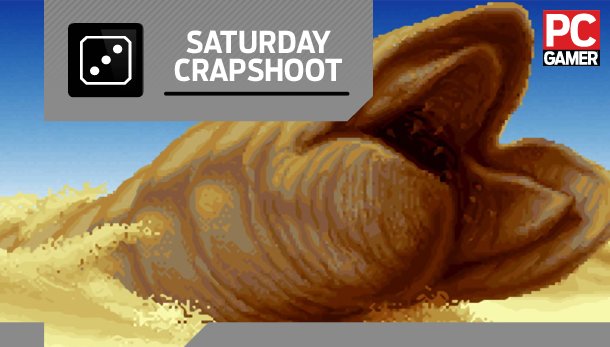
From 2010 to 2014 Richard Cobbett wrote Crapshoot, a column about rolling the dice to bring random games back into the light. This week, the most important planet in the universe is up for grabs. Time to call Muad'Dibs, because Usul, we have word-sign the likes of which even God has never seen!
Even now, it's hard not to feel sorry for Dune, and indeed, for its creators Cryo. Those aren't words you'll hear often, because Cryo's output over the years was... how to put this politely? It was not good. It was not good at all. (How to put it rudely? Its output was about the same as a sewage plant's intake). Mostly it produced tedious games with for-the-time impressive visuals, specialising in truly boring adventures but occasionally branching out to inflict the likes of Hellboy on the world.
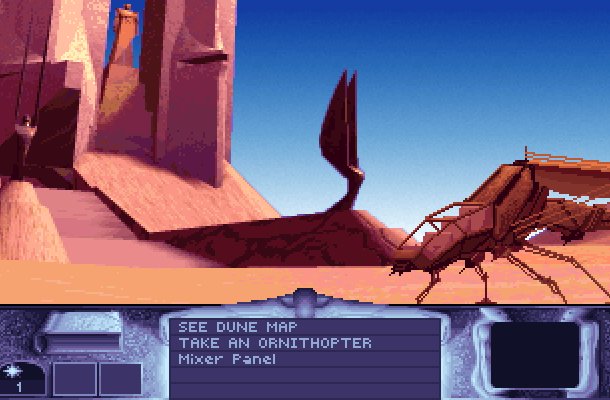
But just as everyone has a good book in them, so can any developer hope to create one genuinely great game—and for Cryo, that game was Dune. Dune (based on the 1984 movie rather than the book directly) was genuinely good, written from the heart, and arguably one of the best film licenses ever to make the jump from silver screen to monitor. And it had a whole five-and-a-half minutes to bask in that glory before Westwood's Dune 2 came along to both single-handedly create the RTS genre, and bury its predecessor under a billion tons of sand. In retrospect, it's hard to blame Cryo for giving up on 'good' games.
Dune follows the premise of the story more than its specific events. You're Paul Atreides, official good guy of the story, whose family has just been sent to the planet Arrakis to mine the spice, melange, which can a) only be found there and b) is the only thing that allows intergalactic society to function. Normally I'd make a crack about poor forward-planning, but this is Dune. If you're a powerful figure not working on some scheme measured in terms of millennia, you're just a rank amateur.
Against the plucky Atreides stand the forces of House Harkonnen, and if you're wondering whether or not they're the baddies here, let this picture sum up everything you need to know in one eye-gouging mass of wobble.
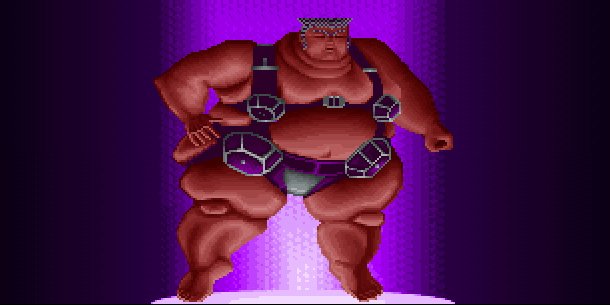
Where the original Dune immediately embarks into a sprawling world of political backstabbery and messianic destiny though, Dune the game reaches for its sword and carves out a space for itself in the Atreides' basic goal: to control the spice, and thus control Dune.
The result is a genuinely clever mix of adventure and strategy game, broken up with regular plot interludes as Paul works with both his family and the native Fremen to keep up with the Emperor's ever-rising demands for spice, and slowly move in on Harkonnen territory. His status as a newcomer to both Dune and mining offers a perfect excuse for everyone to provide instructions and tutorials, while Cryo itself opted for a way of introducing the characters that's so blunt and so shameless that you almost have to admire it...
Keep up to date with the most important stories and the best deals, as picked by the PC Gamer team.
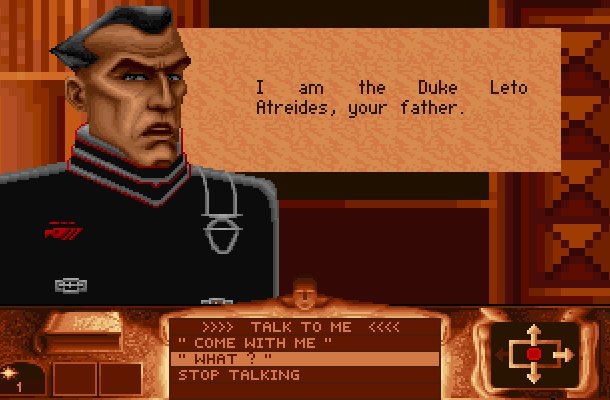
What quickly stands out about Dune is how much love and attention went into it, by regular game standards, never mind book/film licenses. The fusion of genres works perfectly, and is full of great little details like a party system, a desert map full of hidden secrets, multiple ways to use your resources to advance the campaign, and—in the CD version at least—really beautiful rendered flight sequences while traveling between locations. You can skip straight to your destination, but sometimes just have to fly off into the desert to find new tribes of workers and equipment that can be salvaged to boost the Atreides' starting inventory of 'bloody hell no bloody equipment at bloody all'.
Thankfully it turns out to be better than this intro. Oh, the cheese. Especially the bit after the Baron's threat. Just... just no.
And if you really want to get into it, there's the option to play the whole game in Fremen. All menus, all subtitles, in swirling glyphs instead of English. It's a gimmick option for sure, but one that no other game has ever offered! Uh. Except Fury of the Furries. It does, however, tragically miss one trick: the ability to ask the desert tribes how many they number, and be told "I am not a number! I am a Freman!"
Wondering if we're going to get to the other ancient jokes? It seems likely. A Dune deal, even.
The bulk of the early game is spent on a glorified recruiting drive. Most of the Fremen near the Atreides palace take little recruiting, with conversations boiling down to "Want to slave under the sun for the glory of our house?" "Sure, why not, it's not like we have anything better to do." Each improves as it conducts tasks, millennia of tradition apparently paling in the face of being ordered around by a guy who looks a little bit like Kyle MacLachlan, with three core tasks—spice mining, military, and ecology—and a team of prospectors who track down the spice in the first place.
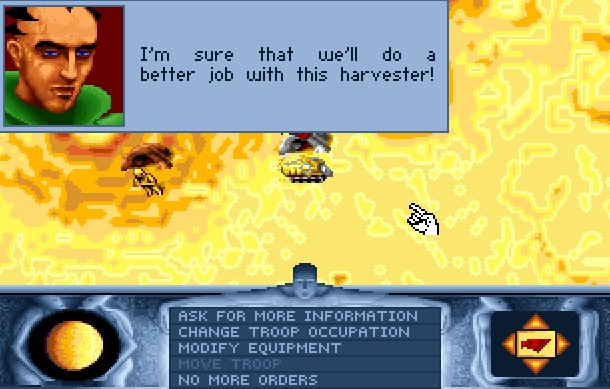
The further out you go though, and the more you ask for, the more Paul has to win their favour, initially by demonstrating an appreciation of still-suits and thus the nature of Dune as a planet, and later by boosting his charisma through diplomacy, victories, and ultimately leading them from the back of a sandworm.
As it goes on, he also slowly changes, his eyes becoming an unnatural blue from exposure to the spice. How do you see this? Simple, because the save game screen is a mirror. Clever. Subtle. If all of Cryo's games had been as well thought out and executed as Dune, I honestly think we might have look back on them as one of the great adventure developers of the '90s, rather than them wearing out their welcome faster than the chocolate eclair joke from Last of the Summer Wine. (For Christ's sake, they're not that expensive. Buy one each already!)
Most of the locations use the same stock graphics, but then, it's not like the Fremen of Sietch Harg have widely different building materials and culture to those of Sietch Tabr, famous throughout the galaxy as the only settlement named after a level password in Jeff Minter's Revenge of the Mutant Camels. They look good, even if a few of the characters are more than a little strange in design.
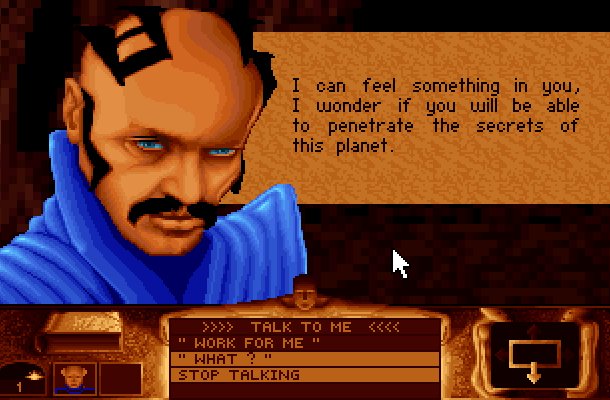
And the Atreides clan isn't much better.
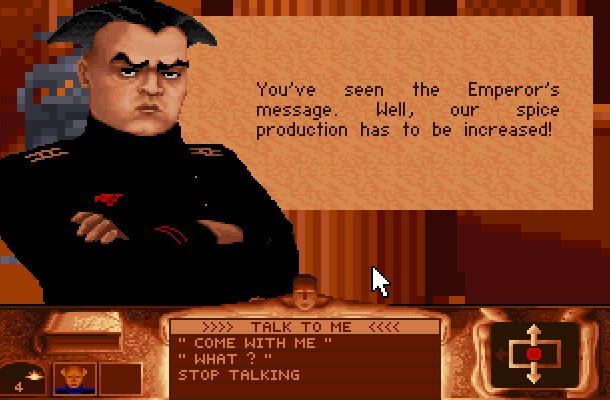
Over the course of the story, Paul also develops a number of special powers, not least telepathic communication and vision, where Paul is thankfully spared seeing a vision of the true hell that is to follow in the wake of his campaign. At that point though, things have gotten quite difficult. The Emperor's demands keep rising, and as you slowly build a revolutionary force with the help of Stilgar and his Fremen with the goal of taking him out once and for all, things only gets more dangerous. Truly, Paul is caught between Arrakis and a hard case. Badoom.
Most of the main Dune characters do show up, despite the simpler story. Gurney Halleck is a handy guide to the local sketches at the start, while Chani fills the 'love interest' role and Thufir Hawat ultimately decides when it's time to assault the Harkonnen palace. It's not easy to get to that point though, with a lot of plot elements to cover, including the growth of vegetation on Arrakis, the need to keep Fremen motivated so that they'll keep working properly, and taking time out for everyone's favourite prank—finding and standing on the smallest patch of rock in the middle of sandworm country and shouting "Betelgeuse, Betelgeuse, Betelgeuse!" Hours of fun for the whole family.
And speaking of the desert penises, here's what turning one into a taxi looks like.
The most notable thing about Dune though will always be how it instantly became overshadowed by Dune 2. The two games even came out in the same year. The story is that Cryo's version was cancelled during development, leading to Virgin tapping Westwood to have their own crack at it, before Cryo revealed that they hadn't actually dropped tools after all and managed to get Virgin to release it. As such, the two games had no connection with each other at all, aside from realising that strategy was the obvious genre to explore.
Westwood dropped almost all of the story in favour of simply having three houses—Atreides, Harkonnen and the newly invented Ordos, or to give it its full title, Ordos Which Must Be Obeyed Without Question—fighting it out with tanks and superpowers. Despite Cryo Dune's popularity, Westwood's was that game that cemented its place in PC history, spawning the Command & Conquer games as well as two sequels—the remake, Dune 2000 and Emperor: Battle for Dune. Neither of which had what it took to stand out, unless you were really into Westwood's goofy FMV.
But Cryo wasn't out yet. Its last project would be an attempt to return to its best—Frank Herbert's Dune, based on the SciFi channel mini-series (this being before it came down with a case of SyFy). Frank Herbert's Dune harnessed everything that Cryo had learned over an illustrious career of Atlantis games and bad 3D games like The Devil Inside, and the completely forgotten Phillip K. Dick-licensed Ubik, and the many, many tears of our own long-departed John Walker during the 2000s, to shit out one last disappointment.
Frank Herbert's Dune was more of an action game than an adventure, released by a company already toppling over the edge of a cliff and taking another planned game, Dune Generations with it. This was due to be an MMO, which given Cryo's level of games at the time would likely have been so face-meltingly bad as to give the Ark of the Covenant nightmares. That might sound unfair, but I'm calling it, not least because I had the misfortune of playing their other big attempt at an online game at the time—a detective game called Fog: Seek The Hidden Truth. It's now so obscure that only a handful of pictures remain of it across the internet to stand as a record of one of the worst attempts at an online adventure ever. And given how poor most attempts at online adventure have been, that is really saying something.
Dune, though, fully deserves to be remembered fondly, as a classic game, as a bold success, and arguably the best of the Dune games full stop when it comes to replicating the feel and spirit of the original. It's not an unknown game by any stretch, but it still deserved better. And Cryo? Well, they would have one other game worth paying attention to under their belt by the end. But that's a story for another week.

